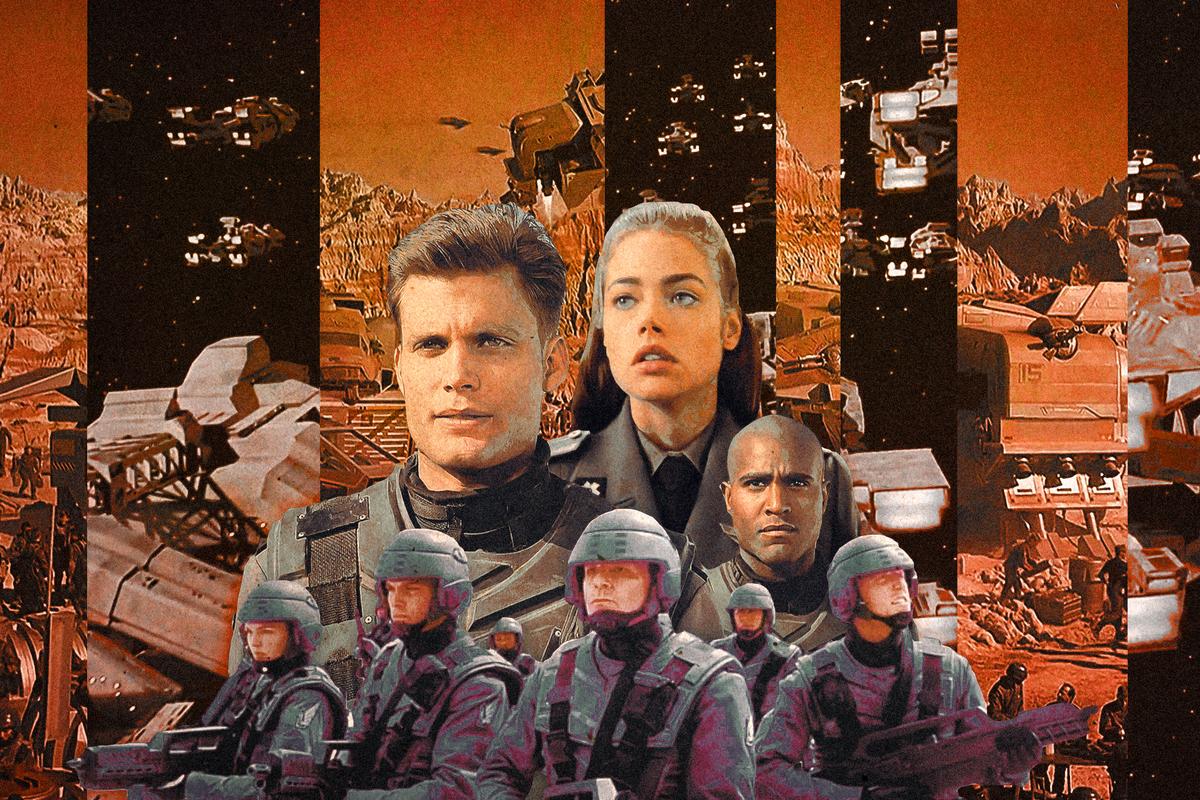
“I stopped after two chapters because it was so boring. It is really quite a bad book.”
It’s not often you find a director trashing the source material of their own movie—then again, there are few adaptations quite like Paul Verhoeven’s Starship Troopers. Robert A. Heinlein’s sci-fi novel of the same name, released in 1959 in response to the United States suspending nuclear testing, extols the supposed virtues of militarism through humanity’s interstellar conflict with an insect-like alien species known as Arachnids. (If there were any doubts that Heinlein’s text should be taken at face value, the book was on the Marine Corps commandant’s reading list until 2020.) Conversely, Verhoeven’s film condemns the military-industrial complex, while underlining that war of any kind perpetuates society’s descent into fascism. The only problem was that, when Starship Troopers arrived in theaters 25 years ago, not enough people were on Verhoeven’s wavelength.
It would be one thing if critics simply didn’t like Starship Troopers, especially after Verhoeven struck out with the reviled—and in some corners, tragically misunderstood—NC-17 flick Showgirls just two years prior. Instead, what’s most bizarre is that some of the film’s detractors perceived its depiction of a fascistic society as a tacit endorsement of it—The Washington Post went so far as to publish a piece decrying Starship Troopers as coming “directly out of the Nazi imagination.” For some reason, Verhoeven’s satirical approach went over the heads of certain viewers, which was especially puzzling since Verhoeven had already made RoboCop, an anticapitalist satire masquerading as an action movie. (Verhoeven also grew up in German-occupied Holland during World War II and has traumatic childhood memories from the experience, so he’d be the last person to earnestly glorify Nazis.)
The good news: In the years since its release, Starship Troopers has been reevaluated and celebrated for its scathing send-up of jingoism, becoming a cult classic in the process. Unfortunately, the movie’s critical reappraisal has coincided with several global powers—the United States chief among them—going down a slippery slope toward fascism. For better or (mostly) for worse, it seems the best time to appreciate what Starship Troopers has to offer is when its bleak vision of the future alarmingly aligns with events in the present. Would you like to know more?
Taking place in the 23rd century, Starship Troopers establishes that Earth is governed by a single entity, the United Citizen Federation, and that mankind is divided into two groups: citizens and civilians. The citizen-civilian dynamic is essentially a futuristic caste system: only citizens, for instance, have the right to vote. (What little is known about civilians in the movie suggests they barely have autonomy under the Federation.) To become a citizen, a person must complete service in the military, which, while not technically mandatory, is seared into the minds of younger generations as a noble pursuit by hawkish teachers. (If the teachers are to be believed, “social scientists brought our world to the brink of chaos” before military veterans intervened.)
Starship Troopers follows four high school graduates as they embark on their military service: dim-witted jock Johnny Rico (Casper Van Dien), his girlfriend Carmen Ibanez (Denise Richards), his best friend Carl Jenkins (Neil Patrick Harris), and classmate Dizzy Flores (Dina Meyer), who has a not-so-subtle crush on Rico. The quartet quickly splits up—Rico and Dizzy join the mobile infantry; Ibanez becomes a pilot; Carl is thrown into the secretive military intelligence division—and learn the true cost of commitment to the Federation. In the words of the maimed veteran who stamps the teenagers’ papers, they’re “fresh meat for the grinder.”
A common complaint directed at Starship Troopers is its focus on these vapid characters, and how they wouldn’t seem out of place on a teen soap. (It shouldn’t come as a surprise that several of the conventionally attractive actors appeared on Beverly Hills, 90210.) But as Verhoeven explained to The Guardian in 2018, he sought to make a movie about “fascists who aren’t aware of their fascism.” The unquestioned loyalty that Rico and Co. have for the Federation makes it all the more harrowing when details trickle in revealing how monstrous this new world order really is. During the infamous co-ed shower scene, in which members of the mobile infantry share why they enlisted, one character says she’s doing it because she wants to have children one day, implying the Federation allows women to do so after completing military service. (Another soldier wants a career in politics, which is apparently only possible for citizens.) The fact that these disturbing revelations happen during an intentionally distracting scene is the brilliance of Starship Troopers in miniature: much like its characters have, it’s easy to lose sight of the bigger picture.
That sentiment extends to the Federation’s conflict with the Arachnids, which, as conveyed through the newsreel sequences that interrupt the film’s main narrative, feed into the idea that war is the only solution. (The one time a reporter briefly speculates that the Arachnids might leave us alone if we did the same, he’s interrupted by Rico shouting “Kill ’em all!”) While Verhoeven uses Leni Riefenstahl’s Nazi propaganda films to inform the movie’s depiction of the Federation, the intentionally misleading and clickbait-y nature of the newsreels feel particularly resonant today, when misinformation in the United States is constantly delivered by certain news channels.
Of course, it’s easier for misinformation to sink in when few people bother to question it. What makes Rico the perfect pawn for the Federation—and arguably the most wooden protagonist in a sci-fi blockbuster until Avatar’s Jake Sully—is his sheer lack of individuality. When Rico keeps getting promoted, mostly because the higher-ups around him continue to die in gruesome ways, all he does is parrot what he’s heard from superiors like Jean Rasczak (Michael Ironside), his grizzled high school teacher who reenlists as a squad leader during the Arachnid war. “I only have one rule: everyone fights, no one quits,” Rico tells a group of new recruits toward the end of the movie, repeating Rasczak’s previous speech verbatim. “If you don’t do your job, I’ll kill you myself.” (On a funnier note, Rico only ends up sleeping with the perpetually horny Dizzy after Rasczak basically tells him to go for it—even the dude’s libido lacks agency.)
Very little progress in the war is made by the time Starship Troopers reaches its conclusion: the only real victory of note is when humans capture a “brain bug” that directs swarms of Arachnids, and begin probing the poor thing with phallic instruments. (Whether or not part of the brain bug’s face was intended to resemble a vagina is between God and Verhoeven.) For Rico and the other survivors, their only reward is a higher rank—and the promise of more interplanetary conflicts to come. While the Federation deliberately evokes Nazi imagery—Carl shows up later in the movie wearing a glorified SS uniform—the notion of war being senseless with no end in sight doesn’t allude to any specific moment in history. At the same time, it’s probably not a coincidence that the movie’s reputation started improving in the aughts when the United States found itself in an ineffectual war of its own doing.
In hindsight, it’s a little unnerving how well Starship Troopers anticipated the “war on terror;” today, the inciting incident to escalate the fight against the Arachnids—a meteorite hurled toward Earth by the bugs that decimates Buenos Aires—feels like a prescient foreshadowing of 9/11 and its aftermath. For the Federation, the Buenos Aires tragedy provides cover to retaliate against the Arachnids without hesitation, despite the fact that the aliens are by and large responding to invasions on their own soil. The parallels weren’t hard to miss—least of all by Verhoeven. “The relevance of Starship Troopers was only appreciated after 9/11,” the filmmaker told IndieWire in 2015. “It wasn’t a prophecy, but a possibility of American life.”
In the dystopian future of Starship Troopers, humanity remains caught in a web of propaganda that gives the illusion of choice—service guarantees citizenship—and fosters the belief that violence is the answer to every problem. But following the needless devastation of the futile war on terror, and democracy being continually threatened by an increasingly fascistic political party, this grim possibility of American life that Verhoeven warned us about is becoming much closer to reality. Verhoeven has done his part; now, 25 years after Starship Troopers made its way into theaters, it’s time we all start taking this razor-sharp satire a little more seriously.


